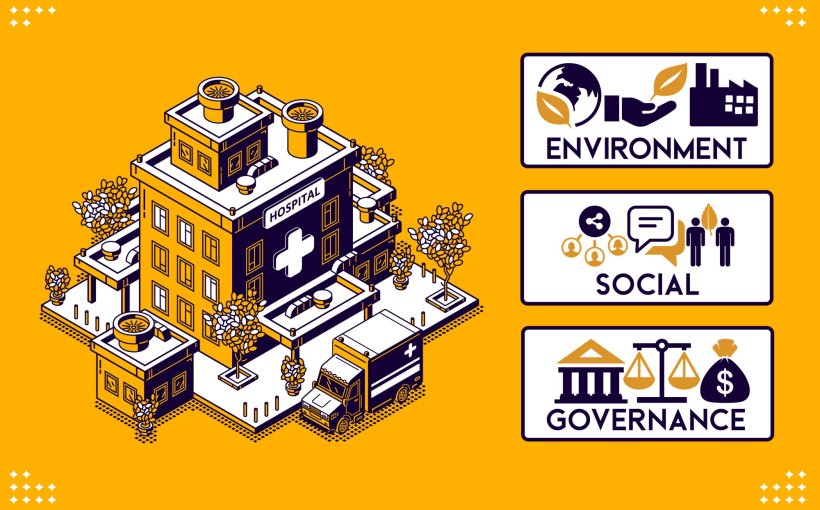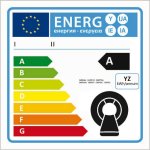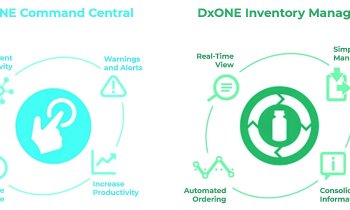
Image source: Adobe Stock/klyaksun (hospital); Adobe Stock/topper (ESG symbols); Collage: HiE/Behrends
Article • Beyond economics
Coming soon: Sustainability reporting for hospitals
A company’s impact on society, economy and the environment cannot be measured in financial terms alone – and hospitals are no exception. On the contrary: the idea of measuring the quality of healthcare only in economic terms has always been fraught with problems. Hospitals as organizations have always played an important social role, and their environmental impact is increasingly recognized as well.
Report: Dr Christina Czeschik
Therefore, it may seem only appropriate that many hospitals will soon be legally required to include non-financial data in their yearly reporting. This is required by the EU Corporate Sustainability Reporting Directive (CSRD). The proposal was adopted by the European Commission in April 2021. As soon as the directive comes into effect, it will expand the requirement of non-financial reporting to all EU companies that fulfil at least two of the following three criteria:
- More than 250 employees
- More than 40 million EUR in turnover
- More than 20 million EUR on the balance sheet
This is not the first attempt of the EU to regulate non-financial reporting: the Non-Financial Reporting Directive (NFRD) has been in effect since 2014. However, it is only applicable to large public-interest companies with more than 500 employees: mainly banks, insurance companies and market-listed companies. All in all, according to the NFRD, about 11,700 companies in EU member states are required to issue non-financial reporting – a number that will increase greatly once the CSRD comes into effect. It is estimated that in Germany alone, the number of affected companies will increase sharply from about 500 to 15,000.
From NFRD to CSRD: Prospective contents of required reports
There is another substantial difference between the current NFRD and the future CSRD: Under NFRD, only the fact that companies published their NFRD reports in time was controlled by authorities. The CSRD, in contrast, does not only demand the formal correctness and timeliness of the report – its contents will be audited as well.
But what exactly is corporate sustainability in the eyes of the European Commission? According to the proposal, the new reporting will have to include the following three main sections, abbreviated as ESG:
- Environmental
- Social
- Governance
Environmental section
The environmental section will have to include information on the effects of the hospital’s operations on climate change and, vice versa, how they will be affected by climate change. Furthermore, the report will need to contain information on responsible use of water and any effects on seas and oceans; on responsible use of other resources and on recycling (circular or closed loop) economies; on pollution of the environment and on the protection of biodiversity and ecosystems.
Recommended article

Article • Energy conservation & waste reduction
Reducing the eco-footprint of radiology
Contrast agents in the wastewater and power-hungry imaging systems: The eco-footprint of healthcare is huge, and radiology departments are among the main culprits. An expert panel at the ECR Overture explored ways to make the field “greener”.
Social section
In the social sphere, hospitals will have to account for an equal opportunity workplace, regarding for example gender equality, ethnic and cultural diversity, LGTBIQ+ rights and others. Another important point is workplace safety, physically and ergonomically as well as psychologically; and finally, the preservation of human rights and democratic principles.
Governance section
Regarding CSRD-compatible governance, the hospital will have to report on the commitment of board and management to the upholding of sustainability principles; on corporate ethics and anti-corruption guidelines and measures; on political activities including any lobbying the organization might be involved in; and on its relationships to suppliers, partners, and other stakeholders.
Timeline from 2022 to 2024 and beyond
From 2024 on, it will be mandatory for all but the smallest hospitals to include all these information in their annual report. However, details are not yet known. The European Commission is expected to publish guidelines for CSRD, analogous to the existing guidelines for the disclosure of environmental and social information (2017) and for the disclosure of climate-related information (2019). These are available at the European Commission website.
CSRD guidelines will most likely encompass general, sector-specific, and organization-specific rules. The first, general set of rules has been announced for October 2022. The sector-specific and organization-specific guidelines will probably follow in 2023.
The European Commission initially intended for the CSRD to become mandatory on January 1, 2024, meaning that the first annual CSRD reports would have to be issued for the year 2023. However, the EU Council requested several changes to these plans, including a grace period of 18 months for member states to implement the new directive. If these changes are accepted, CSRD reporting will not become mandatory until 2025.
How can hospitals prepare for CSRD?
But even if CSRD is put off until 2025, hospitals will have to implement it sooner or later. Now is a good time to take the first steps in preparing for CSRD. While detailed guidelines specifically for the healthcare sector or for hospitals will not be published until some time in 2023, there are other frameworks that can give a first impression of sustainability requirements: existing international guidelines such as those created by the Global Reporting Initiative (GRI), the Sustainability Accounting Standards Board (SASB), the International Integrated Reporting Council (IIRC), and the International Sustainability Standards Board (ISSB), just to name a few. These are supplemented by national guidelines, where applicable, such as the Deutscher Nachhaltigkeitskodex (DNK) sustainability criteria for Germany.
Before detailed CSRD criteria are available, hospitals should not invest massively in CSRD preparations. But some early research into how current quality management, controlling and reporting could be adapted to fulfil CSRD standards will make sure that hospitals are well prepared when the new regulations finally become effective.
15.09.2022








